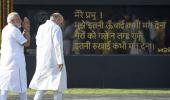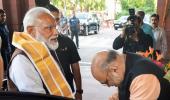After securing his legacy as the most successful Bharatiya Janata Party president, Home Minister Amit Shah has emerged stronger in the country's political landscape, especially within his party and its Hindutva allies, by successfully delivering on his organisation's core promise of revoking provisions of Article 370.

His successful piloting of the move to strip Jammu and Kashmir of its special status is undoubtedly the highlight of his ministerial stint since the Modi 2.0 government assumed office on May 30.
Parliament's nod to the bills to strengthen anti-terror laws during the ongoing session has also bolstered his image on two planks close to the saffron parivar: Hindutva and national security.
After Prime Minister Narendra Modi, Shah is getting the credit for bringing to fruition a cause for which the BJP ideologue Syama Prasad Mookerjee died in a Jammu and Kashmir jail in 1953.
While BJP leaders were expectedly fulsome in praise of Shah in their speeches in Parliament, with some likening him to first home minister Sardar Patel, speakers from even parties outside the National Democratic Alliance fold like the YSR Congress were no less enthusiastic in lauding him.
Party leaders said it was also to the credit of Shah, who remains at the helm in the BJP, that the government was successful in shattering any pretence of the opposition unity by winning over a number of non-allies like the Biju Janata Dal, YSR Congress and Bahujan Samaj Party.
An astute political strategist, Shah framed the debate on resolutions and bills on Jammu and Kashmir around the theme of national security and unity, resulting in a party like Arvind Kejriwal-led AAP, a bitter BJP critic, ending up supporting the treasury benches.
Since joining the Modi 2.0 government, Shah has enhanced his reputation as a champion of Hindutva ideology.
As the BJP president, he was an enthusiastic proponent of his party's contentious core agenda, which also includes building Ram temple in Ayodhya and enacting uniform civil code.
It gladdened the hearts of the party's ever-broadening base but the government's lack of a majority in Rajya Sabha meant that the Narendra Modi dispensation could make no meaningful move in fulfilling these promises.
After playing a key role in charting his party's path to power in many states and a bigger majority in the Lok Sabha in the recent general election, Shah joined the government and spearheaded its exercise on this front.
He has been instrumental in winning over leaders from the opposition, bagging support from non-allied parties and turning the numbers on their head in Rajya Sabha.
On paper, the BJP-led NDA still lacks a majority in the Upper House but the bill to bifurcate Jammu and Kashmir into two states received 125 votes in favour and only 61 against it on Monday.
Political pundits say Shah has used a skilful mix of ideological firmness, unlimited political imagination and realpolitik flexibility to keep the BJP ahead of the game.










